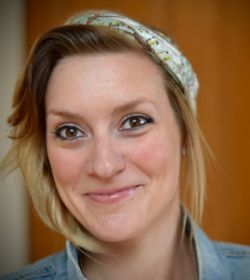
Ellie Hutchinson, BA Development Studies graduate, on gaining momentum in the charity sector.
“Take every opportunity you can on your journey to finding out who you are. Be open to getting it wrong”
How has your career developed since graduating?
After graduating from UEA I volunteered at a youth centre, then at a rape crisis centre whilst working in a number of office and waitressing jobs. I then moved to Edinburgh where I completed my MSc in International and European Politics, whilst working at Scottish Women’s Aid as a Prevention Policy Officer. I became involved in community organising, co-setting up Edinburgh Feminist Network and establishing Edinburgh Hollaback. Whilst at Scottish Women’s Aid I ran the first bystander campaign for over 16 year olds with a focus on further and high education, and I also led the UK’s first campaign to challenge so called revenge porn, which resulted in legislative and policy change in Scotland; something I am so proud of! I then went on to work at Shelter Scotland within the Policy team looking a making renting better, and more recently moved on to become the Strategic Implementation Manager at Canongate Youth, an amazing charity providing services to children and young people aged 5-25. I have also established a new charity called The Empower Project, where we work with young people, civil servants, practitioners and policy makers on tech abuse and violence against women and girls.
"Volunteer! Read! Have fun! Try lots of new things! Be brave!"
What is the most rewarding aspect of your current role?
I am currently leading two fantastic charities and what I love most about them both is working to make life better for children and young people. I love the diversity, the challenges, the values, and the commitment from all the other people in the charity sector. It really is (by and large!) a great sector to work in.
I love being able to hear what children and young people say, and centre that in policy and campaigns work.
What steps did you take in finding employment (e.g. careers centre, job websites, networking events)?
I was involved in grass roots feminist activism and support work on a voluntary basis for 4 years whilst working and studying part-time. It was this experience that complimented my academic study and enabled me to do this work. Community organising is such an important part of understanding how change can happen, and I would strongly advise folk, if they can, to get involved at the grass-roots level.
Find your passion and connect with other people – these people and networks will help you figure out your next steps.
What are the key skills you learnt at UEA?
Having lecturers who presented Marxism, post-colonialism, and feminist thought in open and accessible ways enabled me to learn and grow as an activist, and provided me with a real insight into how gender and development are inherently linked. This knowledge undoubtedly shaped my career aspirations, and made me really reflect on issues like race, privilege, gender, and colonialism within my own practice. It absolutely sharpened my knowledge on how politics works both on the ground and from above. I continue to be fascinated with (and driven by) trying to understand that link between structures and individuals and it shapes all the work that I have done since graduating.
"Having lecturers who presented Marxism, Post-colonialism, and feminist thought in open and accessible ways enabled me to learn and grow as an activist, and provided me with a real insight into how gender and development are inherently linked"
Have they made a difference in your career?
Massively! Studying abroad in Fiji for a semester absolutely improved my understanding and practice, especially deepening my understanding of my role as a white, western women in a development context. This practical knowledge continues to shape the work I do in supporting communities to organise. Who gets to be heard, how and why? These questions are behind everything I champion in both my leadership roles.
What piece of advice do you wish you’d received before you graduated?
Volunteer! Read! Have fun! Try lots of new things! Be brave! The world young people are graduating into is very different to the one I did fourteen years ago. I would say take every opportunity you can on your journey to finding out who you are. Be open to getting it wrong.
Do you have any tips for current students or recent graduates?
Volunteer! If you’re able to do a few hours a month unpaid it can really help. There’s a group called Women’s Worldwide Web that I’m involved in; you can do a few hours a month online to support women from around the world and you can pick it up in lunch breaks/after work so it can fit in around some jobs.
I started off volunteering at an Oxfam music shop, then at a youth club, then as a support worker at rape crisis, and all of them taught me a lot about the issues facing different groups, where I wanted to go in the sector and how I wanted to get there.
What aspect of studying in DEV do you think was most helpful in terms of increasing your employability and/or getting your current position?
The knowledge that I gained through DEV and my overseas study shaped my politics hugely. Working for a feminist NGO and having an academic grounding to support my practice has been really important.
Ellie graduated with a BA in Development Studies in 2004.

:focus(1956x1046:1957x1047))